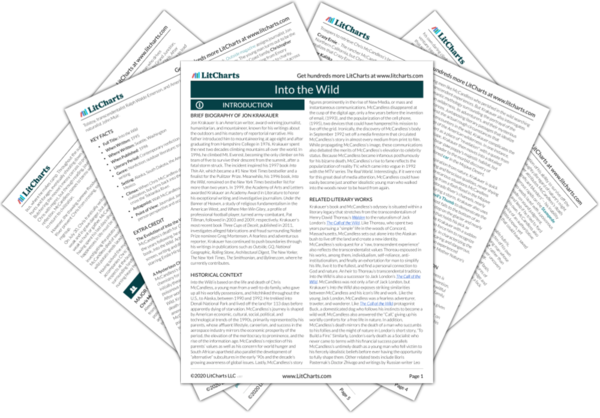Chris McCandless's reinvention into "Alexander Supertramp" is marked by his rejection of money and material objects, as well as his quest for a "raw, transcendent experience." McCandless donates the remainder of his college fund, $24,000, to OXFAM, thereby renouncing his affluent upbringing. He abandons his yellow Datsun in the Mojave Desert, forgoing the convenience of a car to travel on foot. During this time he also burns his leftover cash in a gesture that clearly points to his rejection of capitalistic society.
Underlying McCandless's rejection of money and materialism is his devotion to his ideals, which take shape through the authors and books McCandless reads during his journey. A fan of Leo Tolstoy, (a great novelist who renounced his wealth and privileged background to lead a simple life among the poor), McCandless's itinerant and impoverished lifestyle is almost mirror-like reflection of the ideals Tolstoy espoused in his works. Additionally by hitchhiking across the country, McCandless appears to live his personal philosophy—"that you should own nothing except what you can carry on your back at a dead run"—to the fullest.
Yet McCandless's rejection of material culture comes into friction with society, eventually becoming so extreme that it is unsustainable. While traveling with Jan Burres and Bob he is ticketed for hitchhiking. When crossing the U.S.-Mexican border he is arrested for not carrying an I.D. At the same time, McCandless shows an ambivalent attitude towards work and charity. He expresses discomfort about getting a job and carrying an ID in Los Angeles, and displays listlessness and rebelliousness when flipping burgers at McDonald's in Bull City, but enjoys doing manual labor on Wayne Westerberg's grain elevator in Carthage, South Dakota. Moreover, McCandless is very willing to give away his money and belongings to others in need, but resists receiving help from others, such as food and boots from Jim Gallien and money from Jan Burres, even though his primary mode of transportation—hitchhiking—inherently relies on the goodwill of strangers.
Further, McCandless's resistance to help only goes so far against the elements of the wild. Krakauer notes, "[McCandless] was an extremely intense young man and possessed a streak of stubborn idealism that did not mesh readily with modern existence." He also highlights a journal entry from the time McCandless was camping in the Grand Canyon. McCandless describes the "toll" of such Spartan traveling on his body—severe malnutrition and 25 lbs. lost—but declares that, "his spirit is soaring." While McCandless believes heartily in the transcendence of his soul, Krakauer is quick to point out the unsustainability of Chris's idealism within the physical world. In calling attention to McCandless's laser-focused scrutiny of his soul over his physical wellbeing, Krakauer does not assert that McCandless's search for a "raw transcendent experience" is nearly impossible, but suggests instead that McCandless's idealism is ultimately unsustainable. That McCandless's pursuit of ideals—an idyllic existence in nature cut off from human contact—leads to his downfall appears to prove Krakauer's point.
Materialism and Idealism ThemeTracker

Materialism and Idealism Quotes in Into the Wild
Some readers admired the boy [Chris] immensely for his courage and noble ideals; other fulminated that he was a reckless idiot, a wacko, a narcissist who perished out of arrogance and stupidity—and was undeserving of the considerable media attention he received.
The trip was to be an odyssey in the fullest sense of the word, an epic journey that would change everything. [McCandless] had spent the previous four years, as he saw it, preparing to fulfill an absurd and onerous duty: to graduate from college. At long last he was unencumbered, emancipated from the stifling world of his parents and peers, a world of abstraction and security and material excess, a world in which he felt grievously cut off from the raw throb of existence.
Chris was very much of the school that you should own nothing except what you could carry on your back at a dead run.
Can this be the same Alex that set out in July 1990? Malnutrition and the road have taken their toll on his body. Over 25 pounds lost. But his spirit is soaring.
It is the experiences, the memories, the great triumphant joy of living to the fullest extent in which real meaning is found.
[Chris] was so enthralled by [Jack London’s] tales, however, that he seemed to forget they were works of fiction, constructions of the imagination that had more to do with London’s romantic sensibilities than with the actualities of life in the subarctic wilderness.
Both father and son were stubborn and high-strung. Given Walt’s need to exert control and Chris’s extravagantly independent nature, polarization was inevitable. Chris submitted to Walt’s authority…but the boy raged inwardly all the while. He brooded at length over what he perceived to be his father’s moral shortcomings, the hypocrisy of his parents’ lifestyle, the tyranny of their conditional love. Eventually, Chris rebelled—and when he finally did, it was with characteristic immoderation.
No, I want to hitch north. Flying would be cheating. It would wreck the whole trip.
[Chris] was hungry to learn about things. Unlike most of us, he was the sort of person who insisted on living out his beliefs.
More even than most teens, he tended to see things in black and white. He measured himself and those around him by an impossibly rigorous moral code.
HAPPINESS ONLY REAL WHEN SHARED.
















